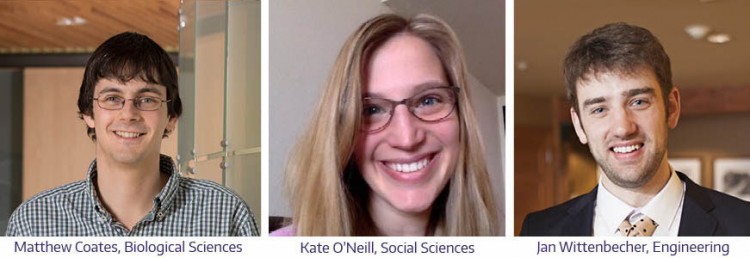 The Graduate School recognizes exceptional scholarship and research at the master’s and doctoral levels. These awards recognize a thesis and a dissertation in four categories: Biological Sciences, Humanities & Fine Arts, Mathematics, Physical Sciences & Engineering, and the Social Sciences. Meet the winners of this year’s Distinguished Thesis Award (awarded in three of the four categories).
The Graduate School recognizes exceptional scholarship and research at the master’s and doctoral levels. These awards recognize a thesis and a dissertation in four categories: Biological Sciences, Humanities & Fine Arts, Mathematics, Physical Sciences & Engineering, and the Social Sciences. Meet the winners of this year’s Distinguished Thesis Award (awarded in three of the four categories).
[expand title = “Biological Sciences: Matthew Coates, master’s in public health in Global Health Metrics and Evaluation ’17, Department of Global Health”]

Thesis: Quantifying Selection Bias from Birth History Estimates of Child Mortality
Please summarize your thesis in lay-person’s terms: We underestimate how many children die in countries without good health data because we can’t ask deceased mothers if their children have died.
Post-thesis life: research associate, Harvard Medical School
What sparked your interest in this topic?
I was working at the Institute for Health Metrics and Evaluation at UW on estimating mortality rates around the world. A newer colleague asked me a question about a gap in the way child mortality rates are estimated, so I started looking into different approaches that the field had used to determine whether or not the data gap led to consequential differences in results.
You earned your master’s degree in Summer 2016. What are you working on now?
I earned my Master’s degree in August 2016. I started working as a Research Associate with the Program in Global Noncommunicable Disease and Social Change (PGNDSC) at Harvard Medical School in the fall of 2016. The PGNDSC houses the Secretariat for the Lancet Commission on Reframing Noncommunicable Diseases and Injuries for the Poorest Billion (Lancet NCDI Poverty Commission, http://www.ncdipoverty.org/). I support the Commission’s efforts by doing quantitative research relating to the burden of disease and intervention strategies for the poorest groups in low- and middle-income countries.
What do you see as the potential public impact of your research?
Child mortality is a key measure used to track progress in global health and development. Many methods used to estimate child mortality depend on mothers answering surveys about their children. Estimates are likely too low in populations with a high proportion of children who are orphans and in which the gap in survival between orphans and non-orphans is large because their mothers cannot be surveyed. Others have done work to account for this limitation in data and methods in populations affected by the HIV epidemic in Sub-Saharan Africa, and my thesis work tries to account for this limitation in the data by using another source of survival information (sibling questionnaires) from the same surveys. More research could be done to validate the approach I took. My hope would be that more can be done to assess the degree to which this challenge in estimating child mortality impacts estimates in other populations that could be affected (for example, in post-conflict settings).[/expand]
[expand title = “Social Sciences: Kate O’Neill, PhD student, Sociology”]

Thesis: “The Adolescent Empathy Paradox and Juvenile Offending: Why Sex Differences in Empathic Ability Can Explain the Gender Gap in Juvenile Offending Behavior”
Thesis, loled: Being a teenager is the worst and boys adapt by being jerks.
Post-thesis life: PhD student, Sociology
How did you become interested in this topic?
Prior to graduate school I spent several years teaching an anger management class to men convicted of domestic violence and working with recently released violent and serious offenders. We did a lot of work on empathy building, but when I went to the literature to find out why I was surprised by how little there actually is on the topic. Furthermore, almost none of the literature I encountered discussed gender differences in empathy and offending in tandem. I saw an opportunity to fill a gap in existing literature and was lucky enough to have the data to do so.
What do you see as the potential public impact of your research?
In addition to further supporting empathy-enhancement rehabilitation programs (like anger management), I hope this research illustrates the danger of reifying gender roles. Specifically, when we reinforce the association between femininity and empathy we are blocking boys from accessing an emotional management and/or communication tool that deters crime.
What’s next for you? Are you building on the same research for your dissertation, or moving in a different direction?
For my PhD, I hope to explore how sex-segregated peer groups in adolescence predict crime across the life course. In layman’s terms, I want to know if having opposite sex friends when you’re a kid helps transmit norms and values that deter crime more so than exclusively having friends of the same sex. From my perspective, this is an extension of my MA work as I ultimately want to speak to gender differences in emotional development and their consequences for offending trajectories across people’s lives.
[/expand]
[expand title = “Mathematics, Physical Sciences and Engineering: Jan Wittenbecher, master’s in mechanical engineering, ’17, Department of Mechanical Engineering/MSME “]

Thesis: Contributions to the Analysis and Design of Mechanical Systems for a Series Hybrid Chevrolet Camaro
Thesis, loled: Hybrid muscle cars would be great if anybody bought such a thing.
Post-thesis life: Emissions certification engineer, General Motors
What sparked your interest in this topic?
The desire to win the EcoCAR 3 competition – an automotive engineering competition sponsored by the Department of Energy and General Motors – and to prove the feasibility of a hybrid muscle car.
Describe the process of the EcoCAR 3 competition.
I was part of a UW team with more than 50 members, competing against 15 other schools. The goal of the four-year competition (2014-2018) is to convert a 2016 Camaro into a series hybrid and add other innovative technologies. This required removing the entire original powertrain (engine, transmission, etc.) and replacing it with a team developed architecture: a very challenging effort for a team of students doing this in their spare time. We had to develop our own mechanical, electrical and software components, source additional ones from suppliers and integrate everything to a working system.
How did your experience writing a thesis impact your career and your position now at GM?
EcoCAR was basically the platform for my thesis work. I wrote about the deep dive I did in three specific areas of mechanical design and analysis for the car (suspension design, engine efficiency analysis and gearbox component design). Writing this thesis had a great impact on my career in two different ways: I learned a lot about automotive technology and regulations which helps me at my job with GM as an emissions certification engineer. It also gave me a lot of exposure to the team’s GM mentor which ultimately lead to me getting a job offer from GM.
[/expand]